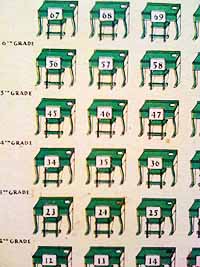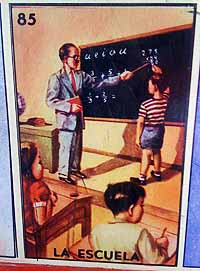The Devoir
I pressed my knees together and wedged them under the tiny desk, perfectly sized for a nine-year old but more than a tight squeeze for me. The other parents, their long legs jutting out into the aisle and chairs pushed back to accommodate adult-sized thighs and bottoms, looked just as uncomfortable. I suppose hosting the parent-teacher meeting in the children’s classroom gives us a sense of their day-to-day environment, but it does put parents at a disadvantage. Hunched over and stuffed into hobbit-sized furniture, it’s hard not to feel like we’re back in school, cowering under the teacher’s strict supervision.
but it does put parents at a disadvantage. Hunched over and stuffed into hobbit-sized furniture, it’s hard not to feel like we’re back in school, cowering under the teacher’s strict supervision.
I remember in grade school, every year, on a night in early autumn, my parents would go to school after dinner for a meeting with my new teacher. During the day, we’d have been given a few minutes to arrange our books in our desks and we’d all work to tidy up the classroom. My father would always return from these meetings shaking his head with feigned disappointment. “Your desk was a terrible mess!” he’d say. The next day, I’d find my notebooks and papers turned sideways and mixed around, the handiwork of my father. Somehow I can’t picture his long legs bent under my primary school desk – I think it was more of a standing around, open-house kind of meeting – but I can picture the smile on his face while he was making mischief inside my desk to complete what was his very predictable annual prank.
These school meetings are important because you actually get to see and hear the teacher. French schools are very much drop-your-kids-at-the-door-and-stay-out-of-our-way. Last year, aside from the initial school meetings, Short-pants’ teacher never once spoke to me, and Buddy-roo’s rather humorless teacher and I had only a handful of exchanges, mostly about logistics. At these meetings you also get data that you might not otherwise pick-up, like how that sheet of paper that you thought was scrap and almost threw out is actually the assignment to research and prepare an oral presentation on Vikings, due next Monday. And with some assurance, you get to see that the other parents – even the fully French ones – are just as overwhelmed by it all as you are.
As the teacher described the work that would be required for each subject, I sank lower and lower in Buddy-roo’s already low-to-the-ground chair. The school meeting is like the door to summer slamming shut behind you. Gone are the blissful evenings of after-dinner walks for ice-cream and a family game of Mille Borne. Now our nights will be spent conjugating verbs, memorizing math tables and reading about Merovingians and Carolingians. The curious what-do-you-feel-like-doing-tonight? is replaced with the commanding fait tes devoirs. The word devoir means to have to, an auxiliary verb that means must or ought. When used as a noun, it can signify an obligation or a duty, or, as in this case, homework. Plenty of it, despite everyone’s complaints and the feeble call to ban it.

So far Buddy-roo’s devoir has been rather reasonable. But supervision is still required. Not so much on the three math problems due for tomorrow, but on the tricky “look-ahead” assignments: the test for next Wednesday which requires more than Tuesday night’s review, or the poetry every other week, which takes several evenings of practice to be able to recite by heart. It is still beyond the capacity of my 9-year-old to take responsibility for anticipating the due dates of these longer-terms assignments. As far as she’s concerned, next week is ages away.
Every evening, then, after a compact day of anticipating my own deadlines and strategizing how to get everything done in time, I find myself having to anticipate their deadlines and strategizing how to get everything done in time. I must survey Buddy-roo’s agenda and manage her homework, pressing her to start memorizing earlier rather than later, to cement her appreciation of Clovis and Pepin the Short and Charlemagne and to place them via historic timeline and accomplishment tonight, even though the test isn’t until next week.
Short-pants is more self-reliant, but she still needs nudging. Her speech on someone she admires wouldn’t have been completed in time had I not elbowed her, twice, to get started on the script. Her science report, identifying and describing the three types of tree leaves she was asked to collect, requires a decent amount of research and it was at my behest that she got started early. I get to be the raised eyebrow behind them both, with my new mantra, “I know it’s not due until next week, but you need to do a little every night…”

Some of the assignments seem, to me, beyond Buddy-roo’s capacity to be finished independently. Then it really starts to feel like homework for me. Maybe I should leave her alone, and let her sputter through and suffer the consequences of failing, but that’s not going to teach her how to do the assignment or help her learn the content. So I give in and help, always starting out as the facilitator, “Why don’t you read those paragraphs and then tell me how you’d summarize it in your own language?” Two hours later, I end up not-so-gently suggesting the answer so we can just get on with it and go to bed.
My greatest concern, beyond the burden this puts on me or De-facto, is the lack of time and freedom for them to imagine, invent and play. I remember coming home from school when I was in 4th grade and going for walks in the woods, playing with neighbors, making up stories and games, reading for pleasure. I rarely had homework at that age, unless it was a special report or project. My mother was happy to help because it happened once a month, not every night. My daughters, in contrast, sit at desks and work all day long, and then are compelled to use their evenings to do the same – and my evenings too.
I’m buoyed by the fact that Buddy-roo’s new teacher exudes warmth and compassion – a welcome change after the last year – and I think her classroom is going to be a much friendlier learning environment. But there are still a lot of musts that come along with the rules of a French classroom, so even though I considered re-arranging the books in Buddy-roo’s desk, just to mess the order up a bit and follow a family tradition, I decided, for her sake, I really musn’t.


September 22nd, 2012 at 9:25 am
i realize how lucky i am.
lou and marine have never had many devoirs. for lou it usually takes 10 minutes max. and the’ve always had enough in their classroom so i only had to check once that the poetry or the lesson was known well enough for the “interrogation”.
till last year i could let them do their homework on their own even if it ment watching marine do an exercise in the morning 10mins before leaving for school (stressful for me).
in their school “devoirs” are quite light and they’re quick. i am lucky.
but this year is different: marine is at college and things are getting serious… interviews to make, books to read with questions, stories to write AND the usual stuff. but still i consider myself lucky. the book to read is bilbot the hobbit which is fun, the story is to be written in pagnol’s style (which i consider intestin and fun too), and in the english classroom their work in teams and can succeed only if the team does which i think is great (not compétition but cooperation). in her classroom, lou has à funny system where she wins stamps for well-behaving, and gets fun stuff from it: the right to make the classroom play à game, the right to chose her neighbour, to stay playing in the play area of the classroom with à friend during “la récréation”…
one French school is quite different from another French school.
September 22nd, 2012 at 4:15 pm
hmm, makes me reflect on myself and how I really never really did get involved and always told Arthur that was his “stuff” to be responsible for and that I was here to help if he needed any help. He often asked me to help and then I did. Of course, he did need help in learning to schedule and we talked about it and he ignored my advice. So, we did have emergency meetings and evenings for both his Greek and Victorian projects in Primary school – makes for fun shared memories now!. I guess I see it as learning the hard way, he never forgot to plan after the second time…whilst knowing I was always there for him…
Secondary school triggered major panics during the first three months and I offered counselling in going back to the teacher and asking more questions. I just signed his homework booklet as required. Arthur grew to be pretty laid-back when it came to home-work and when I think about it, when it came to revisions last year… I started enquiring about revisions and we struck a deliberate deal that I would trust that he was doing what was required and that I would no longer ask. I failed a couple of times but overall I didn’t hassle him or get involved – I just kept the fridge full!
I guess I have always thought it best to make him responsible for the outcome of what he did or didn’t do. Now, he has huge amounts of homework – like 4-6 hours after school – baccalaureat mode – and he talks about some of the things he learns or how tedious some of the things are and I offer sympathy and we talk about the “games” we do have to play to get our place in society…
Your girls are still young yet how will they learn to do it for and by themselves if they know you are holding the clock in your hand for them? And of course, as highlighted by the post above, why not change school if its approach to learning does not seem right to you (and to them?)?
The last thing that comes to mind is how Arthur approached his revision practice for his Grade 7 Saxophone test last year. He explained to me (after the event) how he had decided not to learn and revise a specific set of scales because it would have taken him ages and he knew he would never use them. So he only learnt the basic ones and made it up during the test. This blew my mind as I realised that there is no way I would have dared do this at his age, I would have learnt and practised everything even if I didn’t sleep… I could only smile when we were told that he not only had passed but had been awarded a merit for this one. It indicated to me that maybe he had worked out the “system” for himself which allowed him to have more time to chat on msn with his friends or play rugby…
So I will say that I have probably learnt as much or more from him than he has from me when it comes to learning and that I often think of him as a much wiser person than me… Cx
September 23rd, 2012 at 10:18 pm
from the Kids in France blog: “Homework can also become a source of tension within the home” totally agree, that was the case in my home; mum worked a lot, so I was just expected to finish it (on my own) before she got home; “terminaste los deberes?” made my stomach turn. I totally agree homework should be banned. I read this article yesterday and wished we could all experience a different kind of school: http://www.budgettravel.com/feature/a-family-field-trip-around-the-world,7375/
September 24th, 2012 at 2:13 am
I’ve done a morning or two of homework with Briar. My 7am brain cannot manage the math, nor can it/she/I keep the panic and annoyance out of my voice. Working to schedule the nights, carving out time for devoir and for whatever. I find myself wishing she could have some of the limitless time i did, but I suppose we each have it the way we have it—luckily there are parental quirks to make us smile through it all.